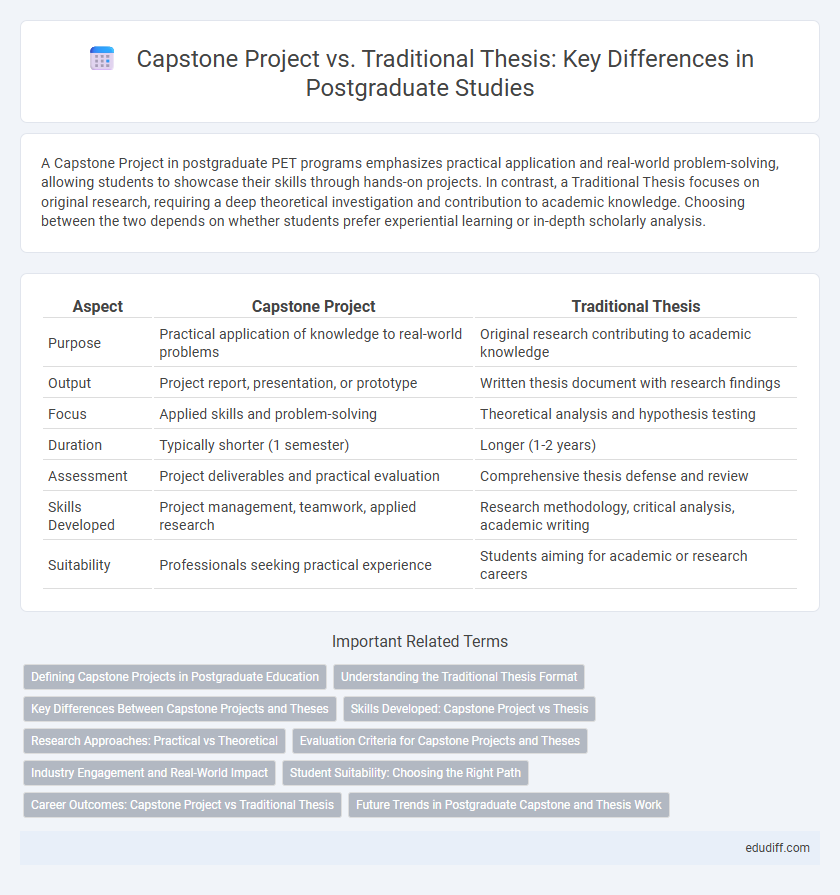A Capstone Project in postgraduate PET programs emphasizes practical application and real-world problem-solving, allowing students to showcase their skills through hands-on projects. In contrast, a Traditional Thesis focuses on original research, requiring a deep theoretical investigation and contribution to academic knowledge. Choosing between the two depends on whether students prefer experiential learning or in-depth scholarly analysis.
Table of Comparison
| Aspect | Capstone Project | Traditional Thesis |
|---|---|---|
| Purpose | Practical application of knowledge to real-world problems | Original research contributing to academic knowledge |
| Output | Project report, presentation, or prototype | Written thesis document with research findings |
| Focus | Applied skills and problem-solving | Theoretical analysis and hypothesis testing |
| Duration | Typically shorter (1 semester) | Longer (1-2 years) |
| Assessment | Project deliverables and practical evaluation | Comprehensive thesis defense and review |
| Skills Developed | Project management, teamwork, applied research | Research methodology, critical analysis, academic writing |
| Suitability | Professionals seeking practical experience | Students aiming for academic or research careers |
Defining Capstone Projects in Postgraduate Education
Capstone projects in postgraduate education are integrative, practice-oriented assignments designed to apply theoretical knowledge to real-world problems within a defined timeframe. Unlike traditional theses that emphasize original research and theoretical contribution, capstone projects prioritize practical solution development and interdisciplinary collaboration. These projects typically culminate in a comprehensive deliverable such as a report, presentation, or prototype that demonstrates mastery of professional skills and academic concepts.
Understanding the Traditional Thesis Format
The traditional thesis format typically follows a structured outline including an introduction, literature review, methodology, results, discussion, and conclusion, emphasizing comprehensive research and critical analysis. This format demands in-depth exploration of a specific research question, supported by extensive referencing and theoretical frameworks. Understanding these components is essential for postgraduate students to meet academic expectations and produce a rigorous scholarly document.
Key Differences Between Capstone Projects and Theses
Capstone projects emphasize practical application and problem-solving within a defined timeframe, often culminating in a tangible product or presentation, while traditional theses focus on original research, theoretical analysis, and contribute to academic knowledge. Capstones typically involve interdisciplinary collaboration and real-world relevance, contrasting with theses that require extensive literature review and methodological rigor. Evaluation criteria for capstones prioritize innovation and implementation, whereas theses are assessed on depth of scholarship and research validity.
Skills Developed: Capstone Project vs Thesis
Capstone projects develop practical problem-solving, project management, and teamwork skills distinct from the research-intensive deep analytical and academic writing skills honed through a traditional thesis. Students engaging in capstone projects enhance real-world application and interdisciplinary collaboration, while thesis students cultivate rigorous data analysis, critical thinking, and scholarly argumentation. Choosing between them depends on whether students prioritize hands-on experience or theoretical expertise in their postgraduate journey.
Research Approaches: Practical vs Theoretical
Capstone projects emphasize practical research approaches by addressing real-world problems through applied methodologies and often involve collaborations with industry partners or communities. In contrast, traditional theses prioritize theoretical research, focusing on abstract concepts, extensive literature reviews, and development of new academic knowledge. Both approaches require rigorous analysis but differ fundamentally in their orientation towards application versus theory.
Evaluation Criteria for Capstone Projects and Theses
Evaluation criteria for capstone projects emphasize practical application, problem-solving skills, and interdisciplinary integration, often assessed through project deliverables, presentations, and stakeholder feedback. Traditional thesis evaluation focuses on originality, theoretical framework, rigorous research methodology, and contribution to academic knowledge, assessed primarily through written documentation and oral defense. Both approaches require critical analysis and clarity, but capstone projects prioritize real-world impact while theses prioritize scholarly depth.
Industry Engagement and Real-World Impact
Capstone Projects emphasize industry engagement by incorporating real-world challenges posed by companies, fostering practical problem-solving skills and direct collaboration with professionals. Traditional Theses focus more on academic research, contributing to theoretical knowledge with limited interaction outside academia. The Capstone approach often leads to immediate tangible impact in industry settings, while Theses primarily influence the scholarly community over time.
Student Suitability: Choosing the Right Path
Capstone projects suit students seeking practical experience and real-world problem-solving, ideal for those aiming to enter the workforce immediately after graduation. Traditional theses benefit students interested in academic research or pursuing further studies, as they emphasize extensive literature review and theoretical analysis. Selecting the right path depends on career goals, learning preferences, and the desired level of research depth.
Career Outcomes: Capstone Project vs Traditional Thesis
Capstone projects emphasize practical skills and real-world problem-solving, leading to higher employability and career readiness in fields like business and technology. Traditional theses prioritize theoretical research and academic contribution, often benefiting careers in academia or research-intensive roles. Employers in industry sectors increasingly value capstone experience for its demonstration of applied knowledge and project management abilities.
Future Trends in Postgraduate Capstone and Thesis Work
Postgraduate capstone projects increasingly emphasize interdisciplinary collaboration, practical problem-solving, and industry engagement, reflecting a shift toward real-world applicability and innovation in higher education. Traditional theses continue to evolve with greater integration of digital tools, data analytics, and open-access publishing platforms, enhancing research visibility and impact. Emerging trends indicate a hybrid approach, blending capstone pragmatism with rigorous academic research to better prepare graduates for dynamic career landscapes.
Capstone Project vs Traditional Thesis Infographic

 edudiff.com
edudiff.com